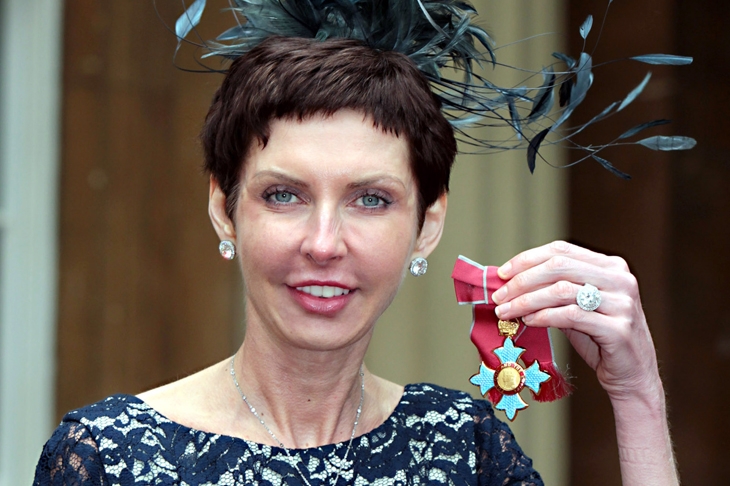I wrote last week of my fear that we’ll never ‘take back control of our fish’, as Brexiteers ardently wish, because the rights of UK fishermen — whose diminished industry contributes less than half a per cent of GDP — will be too easy to give away in the next negotiating phase. Sure enough, last Sunday’s Brussels summit to approve the withdrawal agreement produced an explicit warning from President Emmanuel Macron that unless the UK allows continuing access into its waters for EU (meaning specifically French) fishing boats, he may veto a wider trade deal, which means the hated ‘backstop’ would come into force instead.
That’s quite a threat, reflecting both Macron’s urgent need to deflect rising hostility towards him at home, seen in violent fuel tax protests, and the fact that a third of the catch of France’s northern fishing fleet comes from UK waters. What’s less well known about this battlefront is just how enfeebled our British forces are, after decades of attrition under the Common Fisheries Policy. Reports say half of all the fish quotas allocated under the CFP to English vessels have actually been sold to Spanish, Dutch and Icelandic interests, which operate through UK-registered companies but land UK catch in their own home ports. For Wales, the proportion of quota sold, largely to one Spanish company, is 88 per cent.
Some EU countries forbid the sale of fish quotas, but we allow it presumably because our reduced fleet no longer has the capacity to catch all the fish available in UK waters. The upshot is that even if we ‘took back control’, we could end up selling it back to the continentals. Theresa May’s team knows this and hence, I suspect, regards fishing as a disposable bargaining chip, but that will never play well with voters in coastal constituencies. What a bloody mess she’s in.
Free-market creed
A wave to Lord Vinson, who this week celebrated the opening of a new building that bears his name as Buckingham University’s centre for the study of liberal economics and entrepreneurship. Nigel Vinson, now 87, started his own industrial plastics business in a Nissen hut after national service in 1952, floated it on the stock market in 1969 and went on to a second career (partly encouraged by my banker father) in City boardrooms, and a third as a leading light of the free-market Institute of Economic Affairs.
His speech for the opening ceremony included this creed: ‘Free-market capitalism is not perfect. Casino capitalism is a damaging aberration. Markets need to be conducted within a strong social and moral ethos and a well-regulated framework. They then produce widespread wealth which makes a better world. By that I do not mean making money out of money: I mean the creation of wealth through worthwhile activities in a free society.’ I couldn’t agree more: carve those words in stone.
Wages of sin?
But here’s an example of casino capitalism, in the literal sense, that gives pause for thought. Should we be proud of Denise Coates, the Stoke-on-Trent mother of five whose pay package last year as chief executive of the online betting business bet365 hit £265 million, making her the world’s highest–paid woman? On balance, with a tinge of moralistic regret, I think we should.
With her father Peter and brother John, Denise turned a small family-owned betting–shop chain into a venture that attracts 35 million punters around the world with its offer of ‘in-play’ bets on live sports events as well as poker, bingo and other games. In doing so they have created 3,500 jobs and a cluster of spin-off businesses around Stoke — whose traditional pottery industry now employs a fraction of its past workforce — while clocking up pre-tax profits of
£660 million last year.
To the puritan, those profits will always be tainted; the current debate about fixed-odds betting machines has heightened awareness of gambling as an addiction. But this is a vice that society chooses to license and tax rather than drive underground; and as owners of the enterprise, the Coateses are entitled to divide its legitimate spoils as they wish. That includes, we’re told, support for a children’s hospice and better maths teaching in local schools as well as ownership of Stoke City football club. And unless they have very clever accountants, the family’s accumulated £5 billion fortune must be generating sufficient personal taxes to fund much of north Staffordshire’s NHS provision.
Bet365 may not meet the Vinson test of ‘worthwhile activities in a free society’ and we might wish Denise Coates had decided to revive a pottery instead. But on its own terms, what she has built is remarkable. I’m hoping she’ll now endow a splendid building on Staffordshire University’s Stoke campus, for the study of creative entrepreneurship rooted in its locality.
Bitcoin goes more bonkers
Then again, I hear you say, if I’m prepared to offer faint praise for the kind of casino capitalism that creates homegrown online-betting billionaires, why am I so down on bitcoin? What’s the difference between wagering on the next goal in a faraway football match and chasing the volatility of virtual currencies that now constitute, some say, a $100 billion market?
Well, at least the ball and the goal-keeper are real and there’s a referee on the pitch — which ain’t the case in the bitcoin arena, where the game itself changes by the day, most recently by means of a ‘hard fork’, or acrimonious split, in the spin-off version that calls itself Bitcoin Cash. That may explain why the bitcoin price has dropped more than 40 per cent in the past month. Or it could be my fault, if the video of our recent Spectator debate (Google ‘YouTube Bitcoin or Shitcoin?’ to see it) is going viral. Maybe the world is beginning to agree with my cautiously phrased opening statement that the whole cryptocurrency phenomenon is ‘completely bonkers’.







Comments